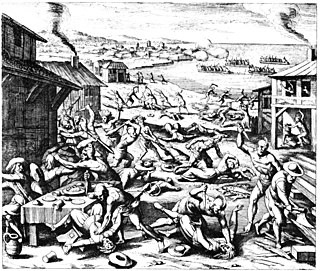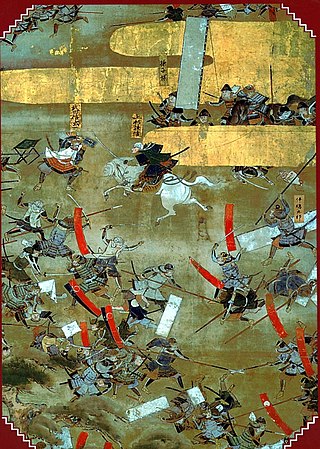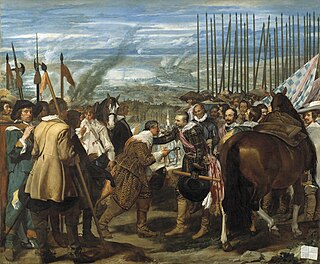
1626 (MDCXXVI) was a common year starting on Thursday of the Gregorian calendar and a common year starting on Sunday of the Julian calendar, the 1626th year of the Common Era (CE) and Anno Domini (AD) designations, the 626th year of the 2nd millennium, the 26th year of the 17th century, and the 7th year of the 1620s decade. As of the start of 1626, the Gregorian calendar was 10 days ahead of the Julian calendar, which remained in localized use until 1923.

Year 1572 (MDLXXII) was a leap year starting on Tuesday of the Julian calendar.

The 1570s decade ran from January 1, 1570, to December 31, 1579.

1582 (MDLXXXII) was a common year starting on Monday in the Julian calendar, and a common year starting on Friday of the Proleptic Gregorian calendar. This year saw the beginning of the Gregorian calendar switch, when the papal bull Inter gravissimas introduced the Gregorian calendar, adopted by Spain, Portugal, the Polish–Lithuanian Commonwealth and most of present-day Italy from the start. In these countries, the year continued as normal through Thursday, October 4; the next day became Friday, October 15, like a common year starting on Friday. France followed two months later, letting Sunday, December 9 be followed by Monday, December 20. Other countries continued using the Julian calendar, switching calendars in later years, and the complete conversion to the Gregorian calendar was not entirely done until 1923.

The 1620s decade ran from January 1, 1620, to December 31, 1629.
The 1630s was a decade that began on January 1, 1630, and ended on December 31, 1640.

1622 (MDCXXII) was a common year starting on Saturday of the Gregorian calendar and a common year starting on Tuesday of the Julian calendar, the 1622nd year of the Common Era (CE) and Anno Domini (AD) designations, the 622nd year of the 2nd millennium, the 22nd year of the 17th century, and the 3rd year of the 1620s decade. As of the start of 1622, the Gregorian calendar was 10 days ahead of the Julian calendar, which remained in localized use until 1923.

1602 (MDCII) was a common year starting on Tuesday of the Gregorian calendar and a common year starting on Friday of the Julian calendar, the 1602nd year of the Common Era (CE) and Anno Domini (AD) designations, the 602nd year of the 2nd millennium, the 2nd year of the 17th century, and the 3rd year of the 1600s decade. As of the start of 1602, the Gregorian calendar was 10 days ahead of the Julian calendar, which remained in localized use until 1923.

1604 (MDCIV) was a leap year starting on Thursday of the Gregorian calendar and a leap year starting on Sunday of the Julian calendar, the 1604th year of the Common Era (CE) and Anno Domini (AD) designations, the 604th year of the 2nd millennium, the 4th year of the 17th century, and the 5th year of the 1600s decade. As of the start of 1604, the Gregorian calendar was 10 days ahead of the Julian calendar, which remained in localized use until 1923.

Year 1561 (MDLXI) was a common year starting on Wednesday of the Julian calendar.

1621 (MDCXXI) was a common year starting on Friday of the Gregorian calendar and a common year starting on Monday of the Julian calendar, the 1621st year of the Common Era (CE) and Anno Domini (AD) designations, the 621st year of the 2nd millennium, the 21st year of the 17th century, and the 2nd year of the 1620s decade. As of the start of 1621, the Gregorian calendar was 10 days ahead of the Julian calendar, which remained in localized use until 1923.

1625 (MDCXXV) was a common year starting on Wednesday of the Gregorian calendar and a common year starting on Saturday of the Julian calendar, the 1625th year of the Common Era (CE) and Anno Domini (AD) designations, the 625th year of the 2nd millennium, the 25th year of the 17th century, and the 6th year of the 1620s decade. As of the start of 1625, the Gregorian calendar was 10 days ahead of the Julian calendar, which remained in localized use until 1923.

1629 (MDCXXIX) was a common year starting on Monday of the Gregorian calendar and a common year starting on Thursday of the Julian calendar, the 1629th year of the Common Era (CE) and Anno Domini (AD) designations, the 629th year of the 2nd millennium, the 29th year of the 17th century, and the 10th and last year of the 1620s decade. As of the start of 1629, the Gregorian calendar was 10 days ahead of the Julian calendar, which remained in localized use until 1923.
The 1560s decade ran from January 1, 1560, to December 31, 1569.

The 1580s decade ran from January 1, 1580, to December 31, 1589.

1580 (MDLXXX) was a leap year starting on Friday of the Julian calendar, the 1580th year of the Common Era (CE) and Anno Domini (AD) designations, the 580th year of the 2nd millennium, the 80th year of the 16th century, and the 1st year of the 1580s decade. As of the start of 1580, the Gregorian calendar was 10 days ahead of the Julian calendar, which was the dominant calendar of the time.

1578 (MDLXXVIII) was a common year starting on Wednesday in the Julian calendar.

Year 1577 (MDLXXVII) was a common year starting on Tuesday of the Julian calendar.

Year 1567 (MDLXVII) was a common year starting on Wednesday of the Julian calendar.

Year 1558 (MDLVIII) was a common year starting on Saturday of the Julian calendar.





















